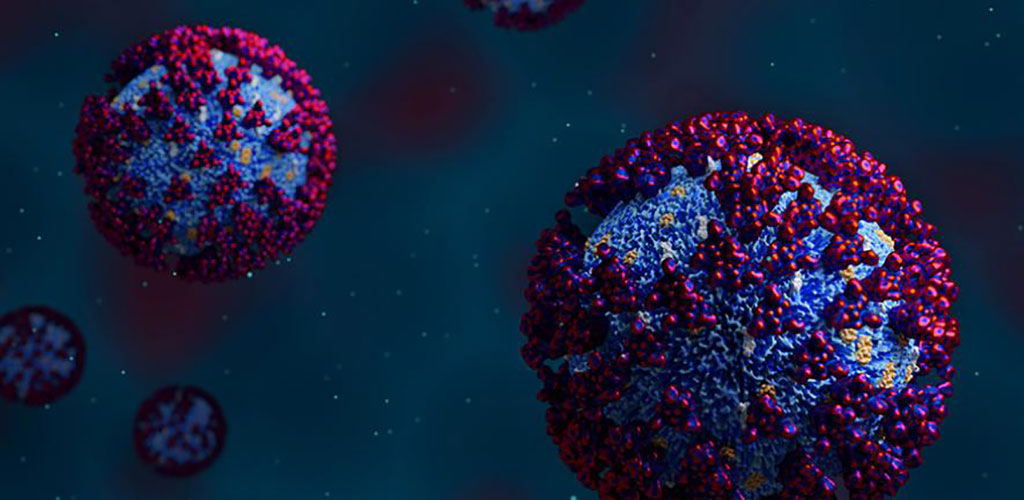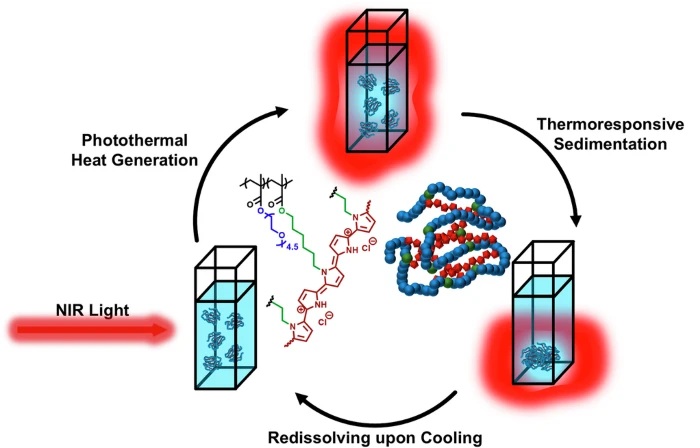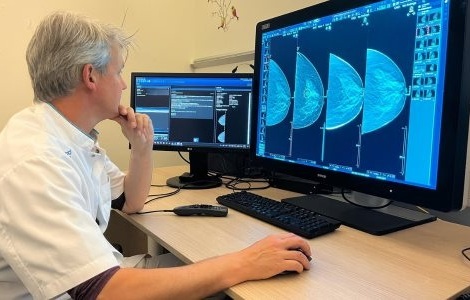New AI Model Based on 3D CT Scans Improves Accuracy of Machine Learning in COVID-19 Diagnosis
|
By MedImaging International staff writers Posted on 17 Dec 2021 |

Researchers have developed an artificial intelligence (AI) model that can diagnose COVID-19 as well as a panel of professional radiologists, while preserving the privacy of patient data.
An international team of researchers, led by the University of Cambridge (Cambridge, England) and the Huazhong University of Science and Technology (Hubei, China), used a technique called federated learning to build their model. Using federated learning, an AI model in one hospital or country can be independently trained and verified using a dataset from another hospital or country, without data sharing. The researchers based their model on more than 9,000 CT scans from approximately 3,300 patients in 23 hospitals in the UK and China. Their results provide a framework where AI techniques can be made more trustworthy and accurate, especially in areas such as medical diagnosis where privacy is vital.
AI has provided a promising solution for streamlining COVID-19 diagnoses and future public health crises. However, concerns surrounding security and trustworthiness impede the collection of large-scale representative medical data, posing a challenge for training a model that can be used worldwide. In the early days of the COVID-19 pandemic, many AI researchers worked to develop models that could diagnose the disease. However, many of these models were built using low-quality data, ‘Frankenstein’ datasets, and a lack of input from clinicians. Many of the same researchers from the current study highlighted that these earlier models were not fit for clinical use in the spring of 2021.
The international team of researchers used two well-curated external validation datasets of appropriate size to test their model and ensure that it would work well on datasets from different hospitals or countries. The researchers based their framework on three-dimensional CT scans instead of two-dimensional images. CT scans offer a much higher level of detail, resulting in a better model. They used 9,573 CT scans from 3,336 patients collected from 23 hospitals located in China and the UK.
The researchers also had to mitigate for bias caused by the different datasets, and used federated learning to train a better generalized AI model, while preserving the privacy of each data centre in a collaborative setting. For a fair comparison, the researchers validated all the models on the same data, without overlapping with the training data. The team had a panel of radiologists make diagnostic predictions based on the same set of CT scans, and compared the accuracy of the AI models and human professionals. The researchers say their model is useful not just for COVID-19, but for any other diseases that can be diagnosed using a CT scan.
“AI has a lot of limitations when it comes to COVID-19 diagnosis, and we need to carefully screen and curate the data so that we end up with a model that works and is trustworthy,” said co-first author Hanchen Wang from Cambridge’s Department of Engineering.
“Before COVID-19, people didn’t realize just how much data you needed to collect in order to build medical AI applications,” said co-author Dr. Michael Roberts from AstraZeneca and Cambridge’s Department of Applied Mathematics and Theoretical Physics. “Different hospitals, different countries all have their own ways of doing things, so you need the datasets to be as large as possible in order to make something that will be useful to the widest range of clinicians.”
Related Links:
University of Cambridge
Huazhong University of Science and Technology
Latest General/Advanced Imaging News
- 3D Scanning Approach Enables Ultra-Precise Brain Surgery
- AI Tool Improves Medical Imaging Process by 90%
- New Ultrasmall, Light-Sensitive Nanoparticles Could Serve as Contrast Agents
- AI Algorithm Accurately Predicts Pancreatic Cancer Metastasis Using Routine CT Images
- Cutting-Edge Angio-CT Solution Offers New Therapeutic Possibilities
- Extending CT Imaging Detects Hidden Blood Clots in Stroke Patients
- Groundbreaking AI Model Accurately Segments Liver Tumors from CT Scans
- New CT-Based Indicator Helps Predict Life-Threatening Postpartum Bleeding Cases
- CT Colonography Beats Stool DNA Testing for Colon Cancer Screening
- First-Of-Its-Kind Wearable Device Offers Revolutionary Alternative to CT Scans
- AI-Based CT Scan Analysis Predicts Early-Stage Kidney Damage Due to Cancer Treatments
- CT-Based Deep Learning-Driven Tool to Enhance Liver Cancer Diagnosis
- AI-Powered Imaging System Improves Lung Cancer Diagnosis
- AI Model Significantly Enhances Low-Dose CT Capabilities
- Ultra-Low Dose CT Aids Pneumonia Diagnosis in Immunocompromised Patients
- AI Reduces CT Lung Cancer Screening Workload by Almost 80%
Channels
Radiography
view channel
X-Ray Breakthrough Captures Three Image-Contrast Types in Single Shot
Detecting early-stage cancer or subtle changes deep inside tissues has long challenged conventional X-ray systems, which rely only on how structures absorb radiation. This limitation keeps many microstructural... Read more
AI Generates Future Knee X-Rays to Predict Osteoarthritis Progression Risk
Osteoarthritis, a degenerative joint disease affecting over 500 million people worldwide, is the leading cause of disability among older adults. Current diagnostic tools allow doctors to assess damage... Read moreMRI
view channel
Novel Imaging Approach to Improve Treatment for Spinal Cord Injuries
Vascular dysfunction in the spinal cord contributes to multiple neurological conditions, including traumatic injuries and degenerative cervical myelopathy, where reduced blood flow can lead to progressive... Read more
AI-Assisted Model Enhances MRI Heart Scans
A cardiac MRI can reveal critical information about the heart’s function and any abnormalities, but traditional scans take 30 to 90 minutes and often suffer from poor image quality due to patient movement.... Read more
AI Model Outperforms Doctors at Identifying Patients Most At-Risk of Cardiac Arrest
Hypertrophic cardiomyopathy is one of the most common inherited heart conditions and a leading cause of sudden cardiac death in young individuals and athletes. While many patients live normal lives, some... Read moreUltrasound
view channel
Wearable Ultrasound Imaging System to Enable Real-Time Disease Monitoring
Chronic conditions such as hypertension and heart failure require close monitoring, yet today’s ultrasound imaging is largely confined to hospitals and short, episodic scans. This reactive model limits... Read more
Ultrasound Technique Visualizes Deep Blood Vessels in 3D Without Contrast Agents
Producing clear 3D images of deep blood vessels has long been difficult without relying on contrast agents, CT scans, or MRI. Standard ultrasound typically provides only 2D cross-sections, limiting clinicians’... Read moreNuclear Medicine
view channel
PET Imaging of Inflammation Predicts Recovery and Guides Therapy After Heart Attack
Acute myocardial infarction can trigger lasting heart damage, yet clinicians still lack reliable tools to identify which patients will regain function and which may develop heart failure.... Read more
Radiotheranostic Approach Detects, Kills and Reprograms Aggressive Cancers
Aggressive cancers such as osteosarcoma and glioblastoma often resist standard therapies, thrive in hostile tumor environments, and recur despite surgery, radiation, or chemotherapy. These tumors also... Read more
New Imaging Solution Improves Survival for Patients with Recurring Prostate Cancer
Detecting recurrent prostate cancer remains one of the most difficult challenges in oncology, as standard imaging methods such as bone scans and CT scans often fail to accurately locate small or early-stage tumors.... Read moreGeneral/Advanced Imaging
view channel
3D Scanning Approach Enables Ultra-Precise Brain Surgery
Precise navigation is critical in neurosurgery, yet even small alignment errors can affect outcomes when operating deep within the brain. A new 3D surface-scanning approach now provides a radiation-free... Read more
AI Tool Improves Medical Imaging Process by 90%
Accurately labeling different regions within medical scans, a process known as medical image segmentation, is critical for diagnosis, surgery planning, and research. Traditionally, this has been a manual... Read more
New Ultrasmall, Light-Sensitive Nanoparticles Could Serve as Contrast Agents
Medical imaging technologies face ongoing challenges in capturing accurate, detailed views of internal processes, especially in conditions like cancer, where tracking disease development and treatment... Read more
AI Algorithm Accurately Predicts Pancreatic Cancer Metastasis Using Routine CT Images
In pancreatic cancer, detecting whether the disease has spread to other organs is critical for determining whether surgery is appropriate. If metastasis is present, surgery is not recommended, yet current... Read moreImaging IT
view channel
New Google Cloud Medical Imaging Suite Makes Imaging Healthcare Data More Accessible
Medical imaging is a critical tool used to diagnose patients, and there are billions of medical images scanned globally each year. Imaging data accounts for about 90% of all healthcare data1 and, until... Read more
Global AI in Medical Diagnostics Market to Be Driven by Demand for Image Recognition in Radiology
The global artificial intelligence (AI) in medical diagnostics market is expanding with early disease detection being one of its key applications and image recognition becoming a compelling consumer proposition... Read moreIndustry News
view channel
GE HealthCare and NVIDIA Collaboration to Reimagine Diagnostic Imaging
GE HealthCare (Chicago, IL, USA) has entered into a collaboration with NVIDIA (Santa Clara, CA, USA), expanding the existing relationship between the two companies to focus on pioneering innovation in... Read more
Patient-Specific 3D-Printed Phantoms Transform CT Imaging
New research has highlighted how anatomically precise, patient-specific 3D-printed phantoms are proving to be scalable, cost-effective, and efficient tools in the development of new CT scan algorithms... Read more
Siemens and Sectra Collaborate on Enhancing Radiology Workflows
Siemens Healthineers (Forchheim, Germany) and Sectra (Linköping, Sweden) have entered into a collaboration aimed at enhancing radiologists' diagnostic capabilities and, in turn, improving patient care... Read more



















